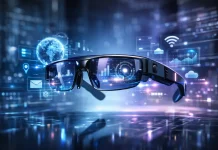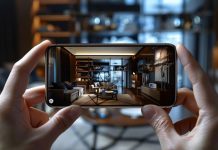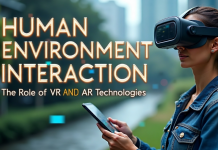Dubai has and continues to draw global investors and people in general. As first- and second-generation technologies continue to transform industries, third-generation technologies, such as virtual reality, are revolutionizing property buying, leasing, and purchasing experiences. This is happening in a city renowned for its unparalleled surprises, Dubai.
From displaying luxury apartments and off-plan projects, Virtual Reality (VR) is changing the way people engage in property deals in Dubai. In this article, we have discussed the fact that this virtual reality is revolutionizing the property-buying business. It does so by providing the buyers with a never-before-seen kind of comfort and accuracy.
Table of Contents
Revolutionizing Property Buying Encounters Using Virtual Reality
The statistic indicates that the global VR market was USD 28.41 billion in 2022. The VR market is forecasted to grow at a CAGR of 13.8% between 2023 and 2030.
In addition, half of the real estate agents agree that AR and VR will be used to sell properties in the future. Also, 5% of the home buyers seemed to be more inclined to do so if they could use AR or VR in home tours. These figures show the gradual increase in awareness of the extent to which AR and VR have transformed real estate.
How Virtual Reality is Redefining the Real Estate Industry
Thanks to modern technologies, the real estate industry has undergone significant evolution, particularly following the COVID-19 pandemic. Physical property viewings and meetings that were standard practice before Covid-19 were not easily possible throughout the period. Thus, real estate professionals, led by example, transitioned to incorporate both AR and VR technologies to fill the gap. This was essential to meet business demands.
In reality, it has transformed real estate activities and exposed new opportunities for enhanced customer services, organizational effectiveness, and international expansion. There are potential reasons why AR and VR are disrupting the intricate real estate system.
- Increased convenience: AR and VR jointly enable potential buyers to visit their desired properties from the comfort of their homes. It helps preserve the time, energy, and money spent traveling.
- Improved decision-making: Buyers can clearly see how a property is laid out and what is offered.
- Advanced engagement: AR and VR can enhance the value of customers’ experiences. This increases their likelihood of purchasing the property by fostering a sense of unity with it.
Virtual Reality for Dubai’s Real Estate Market
Virtual reality (VR) applications have significantly transformed the marketing, viewing, and selling of real estate in Dubai.
Even though the global economy has slowed, Dubai’s real estate market has grown remarkably, thanks to reforms implemented.
1. Virtual Property Tours
Users can interface with the properties themselves in their environment. They don’t just move through rooms, observe subtle details, or get a real feel for space, style, and mood.
Virtual property tours are a convenient way to conduct property tours, helping to save both the buyer’s and seller’s time and money. Sellers can offer their homes to a wider range of potential buyers. This is achieved without the problems of setting multiple appointments for property viewings.
Emaar Properties is among the leading suppliers of real estate services in Dubai. Buyers can access and view their virtual tours using multiple devices. These include smartphones, tablets, and even virtual reality headsets, which enable them to interact with the offered properties.
2. Planning and Designing Architecture Virtually
Virtual reality (VR) technology is used in VR-based architectural design and planning to produce and display architectural designs. Virtual reality enables architects to create layouts that clients can view and comprehend. With conventional 2D drawings and representations, this approach is not feasible.
- VR tools are used throughout the whole process of virtual reality architecture in Dubai, from idea conception to construction.
- VR presents the customer with numerous design possibilities at the beginning of the design process. It allows them to examine and comment on them.
- In the final stages of design, VR creates intricate project models to facilitate construction planning.
These models can be used to identify potential issues with the designs.
3. Customization of Properties and Interactive Virtual Showrooms
Virtual showrooms present properties dynamically and captivatingly. Clients may interact with virtual items and features, view the layout, materials, and finishes of the property, and examine floor plans. Even before building begins, a virtual showroom experience allows purchasers to grasp the property and its possibilities fully.
- Buyers may virtually customize floor layouts.
- Select various finishes.
- Choose your furniture placements.
- Picture how their tastes might seem in the room.
Additionally, it lets the customer try out several alternatives, including kitchen layouts, flooring types, and wall colors.
4. Marketing for Virtual Reality and Virtual Reality Advertising
VR is used to promote real estate. For instance, a real estate broker could build a virtual tour of a house and upload it to social networking sites. Alternatively, the broker could use websites he or she manages. Traditional media is less effective than this method of advertising.
Azizi Developments is a property developer operating mainly in Dubai that deals with residential and commercial real estate. He has seen organizations that have incorporated VR technology into their advertising strategies. This is done by leveraging the Meta Quest 4 headset for immersive property showcases. The website provides information that allows buyers to virtually explore their projects. It offers an aerial view of the available units and related facilities.
Dubai’s Real Estate Projects and Achievements in Property Buying
The Dubai government has provided immense support for VR projects related to real estate. They acknowledge its capability to draw international investors. With these technologies in place, Dubai aims to enhance its market exposure, efficiency, and client satisfaction in the property market.
- Reasons why Dubai is getting more and more engaged in the integration of VR and AR in real estate.
- As a tourist destination, the city can attract potential customers from around the globe by leveraging VR and AR.
- Dubai is one of the most challenging real estate markets; enabling VR and AR agents provides them with an advantage.
- The technology is within reach, and most companies or individuals in the real estate business can easily embrace it.
The Dubai Land Department (DLD) has unveiled the VR Real Estate Platform. This platform allows real estate agents to create and publish virtual reality tours of their properties. Over a thousand agents have registered on the website, and the platform has sold at least one billion properties.
Regarding regulations, the Dubai government has also developed rules for incorporating VR and AR in real estate. This framework provides guidelines and principles for the safe and ethical use of VR and AR.
In Closing
The use of virtual reality to buy or sell properties in Dubai is revolutionizing the real estate market for buyers. By delivering property tours, increasing awareness of off-plan projects, and streamlining purchase procedures, virtual reality is revolutionizing investment for buyers and occupants.
While it aims to sell or rent property, this technology will ensure a seamless, informed, and efficient experience for property buyers. As Dubai continues on its trajectory of creating new and unique opportunities, VR in the real estate industry is expected to rise. This is because buyers and developers gain the chance to connect virtually in another dimension.











